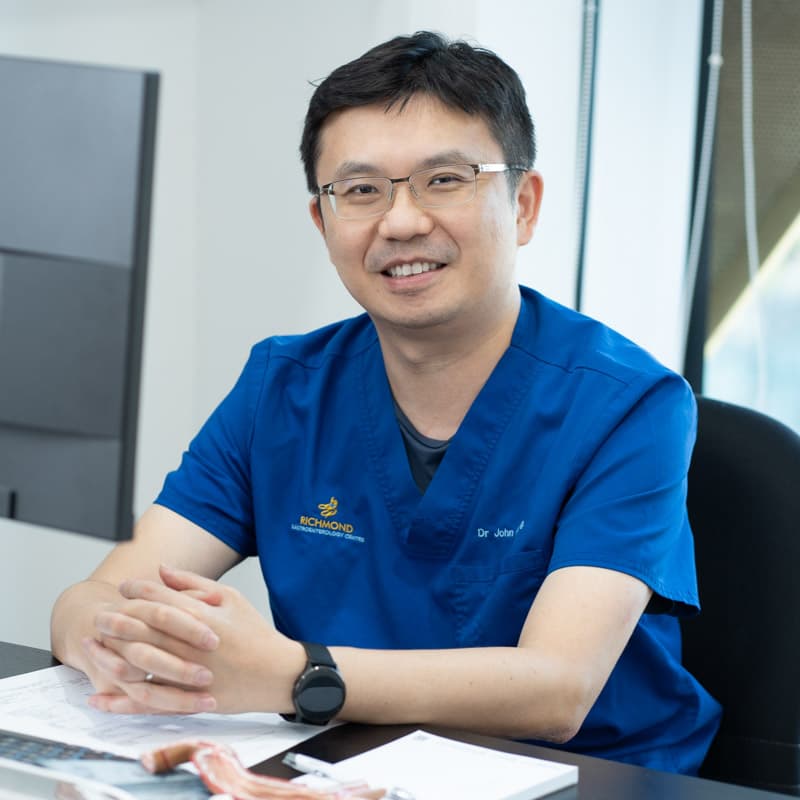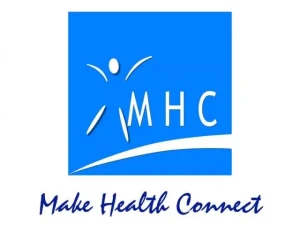GERD & Acid Reflux
Acid reflux, commonly known as heartburn, is a condition where stomach acid flows back up into the esophagus, the tube connecting your mouth to your stomach.
Richmond Gastroenterology Centre

Dr. John Hsiang
MBChB (NZ), FRACP (Australasia), MD (Doctorate), FRCP (Edinburgh), FAMS (Gastro)
Dr. John Hsiang is a distinguished gastroenterologist in Singapore with extensive training and experience in digestive health. He obtained his Fellowship of the Royal Australasian College of Physicians in Gastroenterology in 2012 and holds a PhD in viral hepatitis and fatty liver disease research.
He provides care for a broad range of digestive and liver concerns, combining thorough evaluation with tailored management to support patients’ long-term well-being.
Dr Hsiang is skilled in performing gastroscopy (upper endoscopy) and colonoscopy to investigate symptoms, detect stomach and colon cancers at an early stage, and provide timely treatment options.
With a commitment to individualised care, he applies an evidence-based approach that prioritises accuracy, effectiveness and patient comfort at every stage of diagnosis and treatment.
Languages Spoken:
English, Mandarin and Hokkien
Fellowship Trained Specialist
20+ Years of Clinical Experience

What is Acid Reflux (GERD)?
GERD is a chronic condition where stomach acid repeatedly flows back into the oesophagus (the tube connecting your mouth and stomach).
This backwash, or reflux, occurs when the Lower Oesophageal Sphincter (LES), a ring of muscle at the lower end of the oesophagus, malfunctions and loses its ability to stay tightly closed between meals.
Unlike the stomach, the lining of the oesophagus is not designed to withstand strong acid. This repeated exposure can cause irritation and inflammation, leading to the uncomfortable symptoms associated with GERD.
The Role of Endoscopy in Diagnosing and Managing GERD
A gastroscopy remains the most reliable method for diagnosing and evaluating chronic acid reflux. It plays a key role in the comprehensive assessment and management of GERD for several important reasons:
- Confirming the Diagnosis: Gastroscopy allows direct visualisation of the oesophageal lining, enabling your doctor to confirm signs of acid-related inflammation (oesophagitis) and rule out other potential causes of your symptoms.
- Assessing Severity: It helps determine the extent of any damage to the oesophagus, which is essential for guiding a tailored treatment approach based on the severity of the disease.
Identifying Complications: Importantly, gastroscopy can detect complications of long-standing GERD, such as Barrett’s Oesophagus—a pre-cancerous change in the oesophageal lining—or early signs of oesophageal cancer.
Common Symptoms of Gastroesophageal Reflux Disease GERD
While heartburn is the most well-known symptom, GERD can present in various other ways, including:
Symptoms
- Heartburn: A burning sensation in your chest, often after eating, that might be worse at night.
- Regurgitation: A sour or bitter-tasting acid backing up into your throat or mouth.
- Chest Pain: Non-cardiac chest pain that can be mistaken for heart-related issues.
- Difficulty Swallowing: A sensation of food being stuck in your throat (dysphagia).
- Chronic Cough or Sore Throat: A persistent cough, hoarseness or the constant need to clear your throat.
- Lump in the Throat Sensation: Feeling as if something is stuck in your throat (globus sensation).
Common Misconceptions About Gastroesophageal Reflux Disease
| Myth: “Acid Reflux Is Common, So It’s Not Serious” | Myth: “GERD Only Affects Unhealthy People” |
|---|---|
| While occasional acid reflux is common and usually not a cause for concern, persistent reflux (GERD) can cause lasting damage to the oesophagus. Without proper treatment, GERD can lead to complications such as oesophagitis, swallowing difficulties and an increased risk of oesophageal cancer. | It’s a common belief that acid reflux only affects those who are overweight or have poor lifestyle habits. In reality, GERD can also affect individuals who appear otherwise healthy. It often results from a mechanical issue with the lower oesophageal sphincter (LES), which can weaken due to factors such as ageing, pregnancy or increased abdominal pressure. |
Our Approach to GERD Diagnosis and Treatment
At Richmond Gastroenterology Centre, we strive to provide accurate diagnosis and effective treatment for GERD to relieve symptoms and prevent long-term complications:
Comprehensive Consultation
Our gastroenterologist will review your symptoms and medical history in detail to better understand your condition.
Accurate Diagnosis with Gastroscopy
If GERD is suspected, a gastroscopy may be recommended to confirm the diagnosis and assess the condition of your oesophagus.
Personalised Treatment Plan
Based on the results, your treatment plan may include:
- Lifestyle and Dietary Changes: Guidance on dietary triggers, weight management and daily habits that help reduce reflux and serve as first-line management.
- Medications: Treatment may include proton pump inhibitors (PPIs) or H2 blockers to reduce acid production and support healing of the oesophagus.
- Long-Term Management: If complications such as Barrett’s Oesophagus are detected, a structured surveillance programme will be advised as part of your long-term care.
When to Consult a Gastroenterologist

If you experience persistent or severe symptoms of acid reflux, have any of the “red flag” symptoms mentioned above, or if your symptoms are not well-controlled with over-the-counter medications and lifestyle changes, it is important to consult a gastroenterologist. They can accurately diagnose your condition, rule out other serious issues, and develop a personalised management plan to help you find relief and prevent complications.
Treating GERD at the Source: What We Do
If you experience persistent or severe symptoms of acid reflux, here’s what to expect when you visit our gastroenterologist:

Make an Appointment
Consultation and Diagnosis
Your Treatment Plan
Ongoing Care and Support
Patient Information
How is Gastroesophageal Reflux Disease different from occasional acid reflux?
Occasional reflux is common and usually harmless. Gastroesophageal Reflux Disease (GERD) refers to frequent or persistent reflux that causes symptoms or damage to the oesophagus and requires medical care.
Is Gastroesophageal Reflux Disease a lifelong condition?
For many, GERD is chronic and requires long-term management. Symptoms can often be controlled with lifestyle changes and proper treatment, but they may return if care is stopped.
Can I manage GERD without medication?
Mild cases may improve with lifestyle and dietary changes alone. However, moderate to severe GERD often requires medication to reduce acid and support healing.
Are there long-term side effects of taking GERD medication?
Proton pump inhibitors (PPIs) and similar medications are generally safe when used as prescribed. Long-term use should be monitored to reduce any potential risks.
Will I need surgery for Gastroesophageal Reflux Disease?
Surgery is usually only considered if symptoms are severe, do not respond to medication or if complications arise. Most people manage GERD effectively without surgery.
What foods should I avoid if I have GERD?
Common triggers include spicy, fatty or fried foods, citrus, tomatoes, chocolate, mint, onions, garlic and caffeinated or fizzy drinks. A food diary can help identify what affects you most.
Why do my GERD symptoms get worse at night?
Lying down reduces the effect of gravity, making it easier for acid to move up into the oesophagus. Raising the head of your bed can help ease nighttime symptoms.
Can stress worsen GERD symptoms?
Yes. Stress doesn’t cause GERD directly, but it can worsen symptoms by increasing sensitivity to acid and disrupting eating or sleep habits.
Is GERD common during pregnancy?
Yes. GERD is common in pregnancy due to hormonal changes and increased pressure on the stomach. Symptoms usually improve after delivery but may require short-term treatment
Consult Our Specialist
Experiencing digestive symptoms or discomfort? Speak to our gastroenterologist for a clearer understanding of your condition and treatment options.
You may book an appointment using our contact form or call the clinic at 6517 9958










